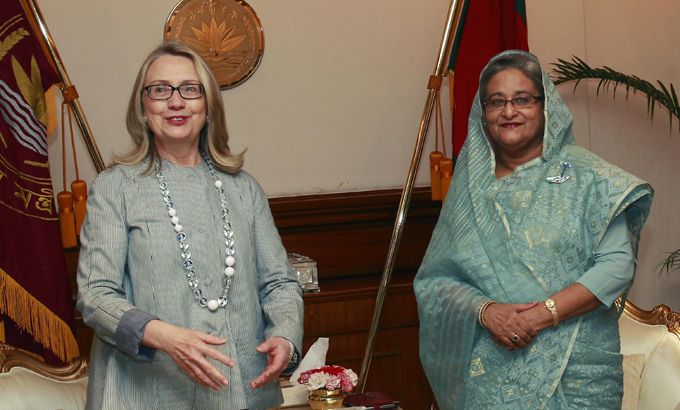Clinton calls for Bangladesh political calm
US Secretary of State says government and opposition must work together amid violent unrest over missing politician.

Hillary Clinton, the US Secretary of State, has called on Bangladesh’s political parties to end their most recent bout of discord, and pressured the county’s government not to undermine the effectiveness of micro-lender Grameen Bank.
Bangladesh has been paralysed by weeks of strikes and protests, and at least five people have been killed since Elias Ali, a prominent opposition leader, disappeared last month.
On Sunday, Clinton said that the unrest had undermined development and was scaring away foreign investors.
She appealed to Bangladeshis to respect the rule of law, and called for a government investigation into the case of the missing politician, as well as allegations of a brutal crackdown on dissent.
“There needs to be total rule of law, with no impunity,” Clinton told a town hall meeting in Dhaka, the Bangladeshi capital.
Clinton said that she told Sheikh Hasina, the prime minister, and Khaleda Zia, the leader of the opposition, that they must overcome years of animosity, particularly as the country prepares for elections in 2014.
“I told them I wish you could figure out ways to work together, you need to work together to get an election mechanism in place,” she said.
“What you need is national unity,” she said. “The people have to demand that.”
Grameen Bank controversy
Clinton also warned the government not to interfere in the functioning of pioneering micro-lender Grameen Bank, saying that it was a key driver of economic growth in the South Asian country.
Sje met with Grameen’s ousted founder – Nobel Prize-winning economics professor Mohammad Yunus – and later voiced strong support for the organisation, which has fallen out of favour with Bangladesh’s ruling party.
“I have followed the dispute over Grameen Bank from Washington and I can only hope that nothing is done that in any way undermines the success of what Grameen Bank has accomplished,” Clinton told the audience at the public question-and-answer session.
“I highly respect Mohammad Yunus and I highly respect the work that he has done and I am hoping to see it continue without being in anyway undermined or affected by any government action. That would be unfortunate.”
Clinton is the first senior US official to visit Bangladesh since 2004, and has used the trip to bolster Grameen and Yunus himself, who was sacked as the bank’s chief last year after the government declared that at 71 years of age, he was beyond the official retirement limit.
Yunus’ supporters say that he was removed as part of a political vendetta by Hasina’s government’s against a potential future challenger to her rule.
The government has not yet named a successor as head of the bank.
Around 10 million Bangladeshis, mostly poor women, have been benefited by small credit offered by the Grameen. The beneficiaries say the money immensely helped them fight – and largely come out of – poverty.
Clinton is a personal friend of Yunus and met with him for about 45 minutes at the US ambassador’s residence before the town hall meeting.
Last month, Bangladesh’s government said it would investigate 54 businesses linked to the Grameen Bank because they had not been authorised by the bank’s board.
A government investigation last year found that the bank had violated its charter by creating affiliates that did not benefit the bank’s shareholders.
Yunus maintains that those social businesses are independent and should not be integrated into any state-owned institutions.
‘Anti-Islam bias’
During the town hall on Sunday, Clinton also said that she was “hurt” by charges that the United States was biased against Muslims.
Responding to a question from a student about perceptions that the US government was discriminatory against Muslims and was engaged in a conflict with Islam, Clinton said: “That hurts me so much. It’s a painful perception to hear about and I deeply regret that anyone believes that or propagates it.”
Clinton said that the decade of US-led wars in Afghanistan and Iraq were “self-defence” after the September 11, 2001 attacks by al-Qaeda and said extremists “perverted” the teachings of Islam.
“Is there discrimination or prejudice in the United States like in every society and country in the world? Unfortunately yes. Human nature has not changed dramatically,” she said.
“There is discrimination against people of different religions, of different races, of different ethnic groups all over the world… but I don’t think that it is at all fair to hold up the United States” over discrimination, she said.
Clinton’s 24-hour visit to Bangladesh came as part of an Asian tour that began in China, where she tangled with Beijing over the fate of a Chinese dissident seeking refuge in the US embassy.
Her next stop is India, where US officials want assurances from New Delhi to cut oil imports from Iran.